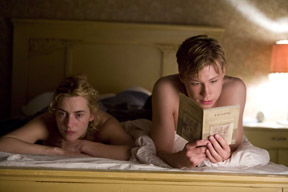 Kate Winslet and David Kross engage in some heavy literature in The Reader.
Kate Winslet and David Kross engage in some heavy literature in The Reader.
|
The Reader
Starring Kate Winslet and David Kross. Directed by Stephen Daldry. Written by David Hare, based on Bernhard Schlinkís novelette. Rated R.
|
|
A D V E R T I S E M E N T
|
|
|
|
A D V E R T I S E M E N T
|
|
Guilty as Charged
Stuffy and incoherent, The Reader bores you with Nazi sex.
By KRISTIAN LIN
Youíve probably heard two things about The Reader. One is that itís about Nazis at a time when our movie theaters happen to be flooded with movies about Nazis (The Boy in the Striped Pajamas, Valkyrie, and the upcoming Defiance). Chalk up the overkill to some bad timing, but remember that Nazis have never fallen out of style as a subject for movies. The other thing youíve probably heard about The Reader is that Kate Winslet is naked in it a lot. This is true, and I wonít lie to you. Itís nice. Yet this teen romance that turns into a feeble Holocaust drama manages to be sleep-inducing despite that.
The bulk of the story takes place in Germany in the 1960s, when 15-year-old schoolboy Michael Berg (played by 18-year-old German newcomer David Kross) falls gravely ill while walking home from school and is helped home by Hanna Schmitz (Winslet), a thirtysomething streetcar conductor whoís a stranger to him. After he recovers, he visits her to express his gratitude and winds up in bed with her. Their affair lasts through the summer, ending abruptly when she disappears one day. Michael doesnít see her again until six years later, when heís a law school student attending a trial of women who worked as guards in a Nazi prison camp. There he sees Hanna as a defendant. Framing this plot is a flash-forward taking place decades later, as the middle-aged Michael (Ralph Fiennes) tries to reconcile his obligations to both the aged, imprisoned Hanna and the victims of the Holocaust whom she shepherded to their deaths.
The filmís title comes from Hannaís fondness for having Michael read aloud to her from the literature books assigned to him in school, a fact with multiple resonances over the course of the story. The plot is taken from a 1995 novelette by Bernhard Schlink, which elegantly poses such knotty questions as where does individual guilt end and collective guilt begin when one culture commits wholesale genocide on another? Issues like these hold great urgency, especially for postwar Germany, but little of that urgency comes across in the hands of director Stephen Daldry and writer David Hare, the same duo who six years ago gave us another suffocatingly tasteful literary adaptation in The Hours. They never find a cinematic way to express Schlinkís anguished philosophical ruminations, so what weíre left with is the story of a boy who has a few months of hot sex and pays for it the rest of his life by turning into a world-class moper whoís unable to love anyone because of his crushing guilt. Thatís harsh.
What does he have to feel guilty about, anyway? After all, he doesnít know about Hannaís past when they meet. Maybe itís because he fails to save Hanna from herself at the trial, when itís within his power to do so. Indeed, his professor (Bruno Ganz) tells him he has an obligation to present evidence if heís got it. Why doesnít he act on that? If that is the source of his guilt, why does he make no further reference to it? Maybe simply being German is enough to trigger his complex, but if thatís the case, shouldnít someone tell him that the Holocaust wasnít his doing? There are too many gaps here. Through the character of Hanna, Schlink carefully delineates the moral paralysis that affected many culpable Germans who abetted the Holocaust and then decades afterward couldnít see how they might have acted otherwise. These get lost in the transition from page to screen, and even Winsletís skills canít make sense of the characterís motivations.
Weíre clearly meant to come away thinking that Michaelís underage sexual adventures with an older woman have damaged him as an adult, but the filmmakers canít find a way to illuminate this, either. The Reader trades on the tired old canard of Nazis being sexual deviants. This doesnít originate with the film; Nazis have long been depicted in fiction as rapists, sadists, pedophiles, and other types of perverts. This dates back at least to Roberto Rosselliniís 1946 film Open City. This long history makes it no less ridiculous to think that the Nazis had sex in fundamentally different ways from us or that thatís the reason why they were monsters.
The plentiful sex scenes in the movieís first third eventually give way to flat courtroom theatrics and a prison correspondence that Daldry is too well-mannered to make interesting. A drawn-out epilogue has the grown-up Michael visit a Holocaust survivor (Lena Olin) who tells him that ďIf you want catharsis, go to the theater.Ē Those are strong words from a film that has nothing of the kind to offer its own viewers. The Readerís only value is as a movie to recommend to your friends if you want them to think that youíre really deep.
 Email this Article...
Email this Article...

